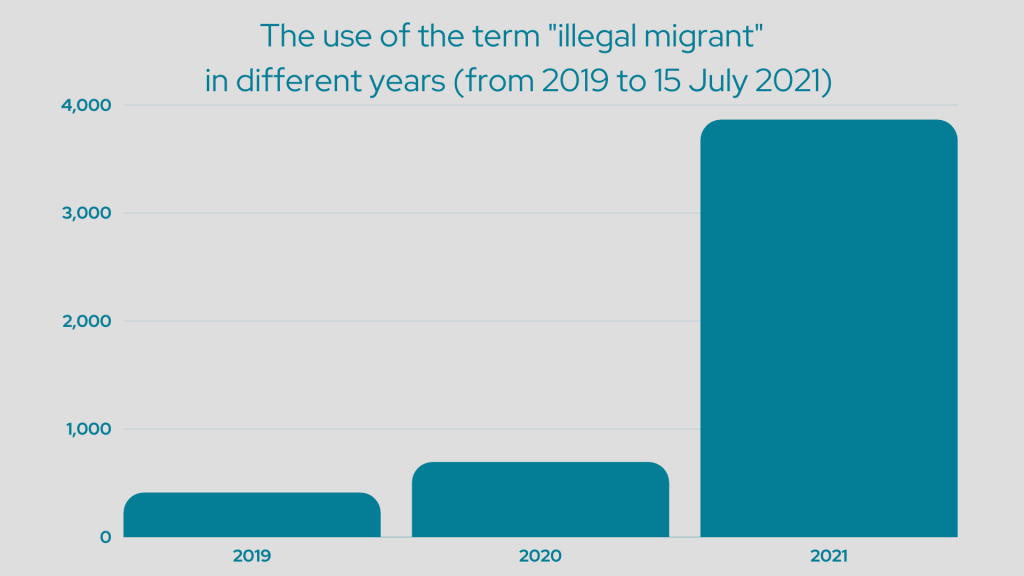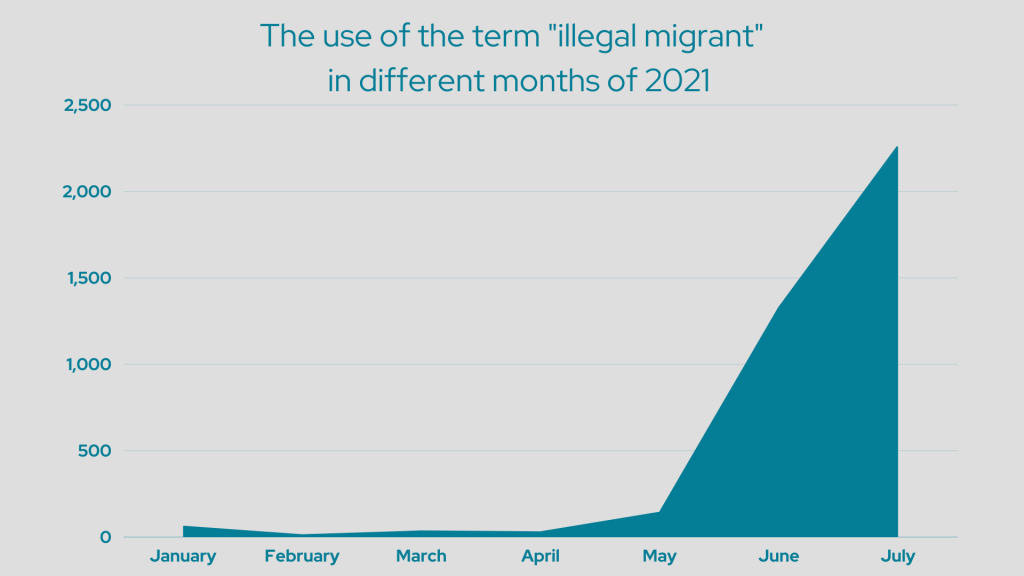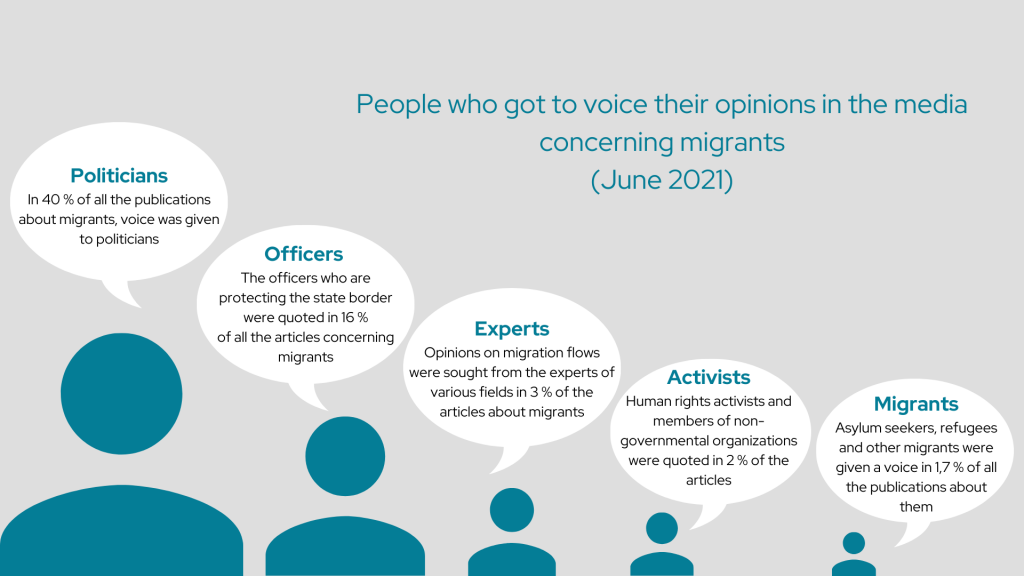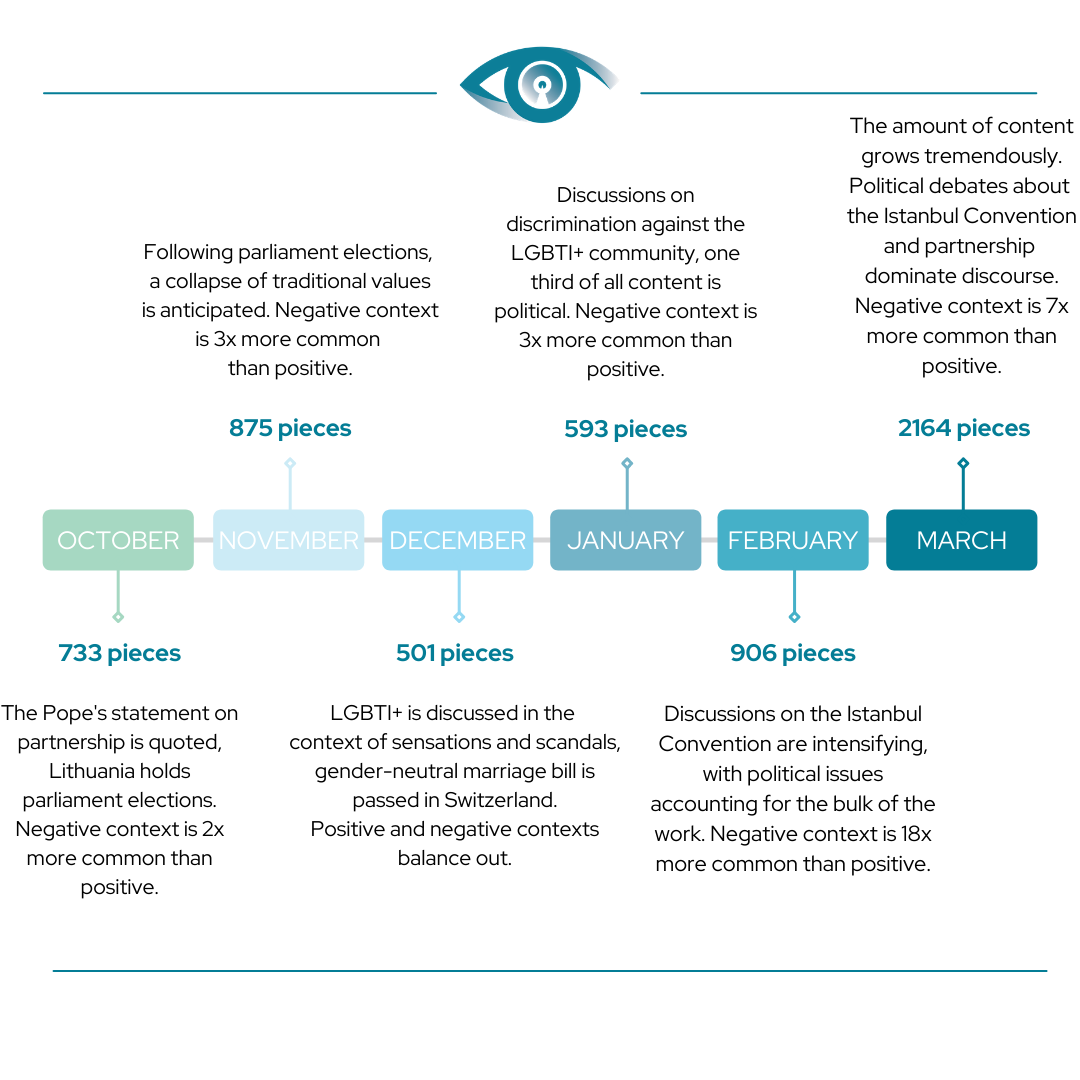Increased migration flows from Belarus to Lithuania sparked a crisis not only at the border but also in the media. There are clear elements of inducement of public panic in the media. Reports of arrests at the border predominate, loud anti-migrant political phrases are constantly repeated, while the migrants themselves are rarely given a voice. In addition to all of that, the term “illegal migrant” is regularly used despite the fact that it has been removed from the vocabulary by both the United Nations and major news agencies such as the Associated Press.
The Crisis of Migrant Representation in the Media
Increased migration flows from Belarus to Lithuania sparked a crisis not only at the border but also in the media. There are clear elements of inducement of public panic in the media. Reports of arrests at the border predominate, loud anti-migrant political phrases are constantly repeated, while the migrants themselves are rarely given a voice. In addition to all of that, the term “illegal migrant” is regularly used despite the fact that it has been removed from the vocabulary by both the United Nations and major news agencies such as the Associated Press.

Illegal or a migrant?
Media monitoring by Media4Change shows that the use of the term “illegal migrant” has increased by the end of May this year. In June, the term “illegal migrant” was used almost three times more often than in the whole of 2020 and more than one and a half times more often than in 2019. In June, this term was repeated 1,168 times in the media, and in the first half of July, it was used more than 2,257 times already.

Along with the use of the term “illegal migrant”, the number of media works presenting migrants in a negative context has also increased. In June, negative-context publications on migrants accounted for a third of all publications. During the same period last year, the negative context was recorded in just over a tenth of publications, and in 2019 by only 4 per cent.

An expert from Diversity Development Group, Giedrė Blažytė and Kristina Mišinienė, Head of the Center for Combating Human Trafficking and Exploitation, recommends avoiding the term “illegal migrant” as it is:
- Not accurate because it creates a direct link between migration and criminal activity. Violation of the law cannot make a person “illegal”, as the use of this term suggests. In addition, the adjective “illegal” is used exclusively to describe migrants, and, for example, Lithuanian residents who have violated the law are not called “illegal” citizens.
- In the long run, the use of this term leads to the abbreviation “illegals”. In this way, migrants are dehumanized and turned into criminals, despite the fact that the search for asylum is one of the natural human rights and not a crime.
- It does not correspond with the values of democracy. The United Nations recognizes the term “illegal migrant” as discriminatory as it is a negative term that historically almost never has been used to describe privileged groups.;
- Informing about the political situation in the countries from which migrants are arriving. The nationality of detained migrants usually is mentioned, but there is a lack of information on political status of their home countries, which could explain the reasons for arrival of migrants.
- When mentioning statistics, present the context of it.
- Going deeper and checking the information provided in the public space, for example, it should not be speculated how much Lithuanian funds will be needed to maintain migrants.
- KSpeaking not only about the consequences of the situation (arriving migrants), but also about its causes, such as the Belarusian regime’s border decisions.
The UN Refugee Agency proposes changing the term “illegal migrant” to “undocumented migrant” or “irregular migrant”.

After the increase of migration flows, why do we not hear the voices of migrants?
In the abundance of reports about detaining migrants in June only in 1.7 % of articles, migrants themselves were interviewed.
K. Mišinienė emphasizes that ignoring the voice of migrants contributes to the formation of a stigmatizing attitude: all migrants start to be seen as criminals looking for ways to enter countries of higher economic status.
Often, people flee their home countries because of persecution, torture, fear of war, during the times of climate change more people flee their home countries due to poor living conditions. Every undocumented migrant has their own unique story, which often goes unheard in the media.
Media4Change’s media monitoring shows that publications on migrant integration do not account for as much as half a percent of all June publications that mention migrants.
According to K. Mišinienė, the lack of discussions about the integration of migrants contributes to inciting fear.
“It responds to this public fear: “we don’t want them, we just want to detain and return them”, and if we start talking about integration, it means we’re already conceding a little bit, we recognize that they have a reason to stay in our country and use our funds, ” notes K. Mišinienė.
It is important not only to give the public the opportunity to learn about real stories of migrants, but also to do so without violating their rights. In order to fully reflect the situation, it is important that the journalist comes to the interview without preconceptions.
“There are two poles of depiction of undocumented migrants. Either he/she is a criminal, or he/she is an exaggerated victim. I think people who write are tangled between these two poles. Meanwhile an undocumented migrant has his or her own unique story, and in order to hear it, we need to come to the conversation as clean as a clean sheet of paper, ” says K. Mišinienė.

Is the opinion of politicians only one that matters?
Journalists usually seek opinions on migration from politicians and officials of the State Border Guard Service. In June, politicians were quoted in 40 % of all the articles concerning migrants and officers who guard the border were quotes in 16%.
There are cases when the media repeats phrases used by politicians or officials that encourage racial prejudice.
For example, the Commissioner General’s advice to suspect all “people who don’t look of European descent” on 9th of July was repeated 9 times and on 14th of July, police issued a request: “If you notice non-European individuals, call the emergency number.”
These quotes when published in the media reach a wide audience, a part of which, while relying on the wording provided by officials, may begin to associate the alleged people of “non-European descent” with threat. This encourages hostility in society towards people of another race or origin.
The constant emphasis on the positions of politicians and officials in the media can contribute to the formation of negative attitudes towards migrants, so it is important to provide the context and the positions not only of politicians or officials, but also of human rights experts and members of non governmental organizations.
Doesn’t the context matter?
Statistics on detained migrants are regularly reported in the media, but the context of the situation is rarely described. Diversity Development Group expert G. Blažytė points out that there is also not very well-thought-out contextual data, for example, the migration situation is compared with 2020.
“We can’t compare it to 2020, because it was a pandemic year and border crossing statistics were really not that big. The Red Cross states that no asylum applications were submitted from March to July at all, ”says G. Blažytė.
Several ways to present the migration situation to the public more accurately:
“We must call criminals not those people who have fallen into this situation, where they are being used, but those who have led them to this situation,” says G. Blažytė.

Is it more important to scandalize than present the real situation?
Neringa Jurčiukonytė, the head of Media4Change, emphasizes that after the increase of migration flows there is a growth of hostility and fear in society, which causes concern. Therefore it is especially important for journalists to provide the latest information in a tone that would neither frighten nor diminish the seriousness of the situation.
“We believe that the role of the media and journalists is to provide citizens with verified, accurate, factual information and to avoid sensations that could cause panic and fear,” says the head of Media4Change, an organization fighting for the highest media standards.
N. Jurčiukonytė notices that special attention should be paid to loud headlines. Hyperbolized concepts in headlines can distort the entire content of the message for the reader and leave a negative impression of migrants, whether it was intended in the message or not. The use of terms such as ‘flood’, ‘invasion’, in addition to the already discussed term ‘illegal migrant’, links migrants to threats and encourages hostility towards them.
Applying for asylum is not an illegal act, and the fact that the Belarusian regime uses migrants does not mean that they are their allies, therefore Media4Change recommends not linking migrants with illegal or harmful activities.


